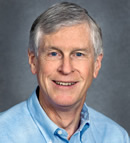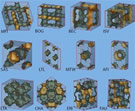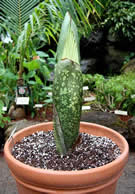

Meet Melissa Summers, the Lab’s new Carbon Cycle 2.0 Campaign Manager. With a doctorate in chemistry and legislative experience in the nation’s capital, Summers will be working to raise the profile of Carbon Cycle 2.0 at the Lab, including holding seminars, short courses, and other events to raise awareness and encourage collaboration among groups working on climate and energy research.
One of Lab Director Paul Alivisatos’ two major science initiatives, Carbon Cycle 2.0 is a multidisciplinary approach to developing ways to help restore the balance in Earth’s carbon cycle. As the campaign manager, Summers will be working directly with researchers across the Lab to facilitate communication and interdisciplinary research. “Ultimately we’d like to show the rest of the world and the other national labs that Berkeley Lab has this really unique capability in energy analysis and climate modeling,” she says. “But to get there, we have to coalesce internally and make sure we’re all aware of what everyone else is doing.”
Summers comes to Berkeley Lab from the National Science Foundation’s Office of Legislative and Public Affairs, where she was the AAAS Science and Technology Policy Fellow, a position she held for two years. Part of her job included organizing briefings for members of Congress and their staff and completing a comprehensive report on NSF’s climate change research portfolio. Summers, who grew up in New Mexico, has a Ph.D. in chemistry from UC Santa Barbara and did postdoc work at Stanford University in photovoltaics.
 The first match of the Carbon Smackdown Summer Lecture Series takes place Wednesday, June 30. Ashok Gadgil, Kayje Booker, and Adam Rausch will discuss how their work on efficient cookstoves for the developing world—from Darfur to Ethiopia and beyond—is reducing carbon dioxide emissions while also saving forests and improving health. Go here for the full summer line-up of matches pitting Berkeley Lab scientists against carbon dioxide. All lectures start at noon in the Bldg. 50 Auditorium.
The first match of the Carbon Smackdown Summer Lecture Series takes place Wednesday, June 30. Ashok Gadgil, Kayje Booker, and Adam Rausch will discuss how their work on efficient cookstoves for the developing world—from Darfur to Ethiopia and beyond—is reducing carbon dioxide emissions while also saving forests and improving health. Go here for the full summer line-up of matches pitting Berkeley Lab scientists against carbon dioxide. All lectures start at noon in the Bldg. 50 Auditorium.
 John Beyer of the Earth Sciences Division was awarded $130,000 through the American Recovery and Reinvestment Act to collaborate with the Tri-Carb Consortium for Carbon Sequestration—comprising Sandia Technologies LLC, Conrad Geoscience, and Schlumberger Carbon Services—to characterize the Newark Basin in southern New York and northern New Jersey, a promising area for large-scale geologic CO2 sequestration. Beyer will serve on the Project Advisory Committee and Nic Spycher will conduct numerical model simulations of the interactions of CO2 with reservoir rock and brine to estimate these chemical interactions associated with the transport and fate of CO2 in the deep subsurface. This work will contribute to a preliminary assessment of the suitability of this geologic region for CO2 storage.
John Beyer of the Earth Sciences Division was awarded $130,000 through the American Recovery and Reinvestment Act to collaborate with the Tri-Carb Consortium for Carbon Sequestration—comprising Sandia Technologies LLC, Conrad Geoscience, and Schlumberger Carbon Services—to characterize the Newark Basin in southern New York and northern New Jersey, a promising area for large-scale geologic CO2 sequestration. Beyer will serve on the Project Advisory Committee and Nic Spycher will conduct numerical model simulations of the interactions of CO2 with reservoir rock and brine to estimate these chemical interactions associated with the transport and fate of CO2 in the deep subsurface. This work will contribute to a preliminary assessment of the suitability of this geologic region for CO2 storage.
 Researchers in the Computational Research Division have received more than $4 million in funding for six projects that will help develop computational methods to answer some of the nation's most pressing questions regarding energy efficiency, climate stabilization, and next-generation, carbon-neutral energy sources. Three of the six projects address research in carbon capture and sequestration, three address solar energy, and one also addresses combustion efficiency. The lead PIs from Berkeley Lab include Phillip Colella, Wes Bethel, David H. Bailey, and Esmond Ng. More>
Researchers in the Computational Research Division have received more than $4 million in funding for six projects that will help develop computational methods to answer some of the nation's most pressing questions regarding energy efficiency, climate stabilization, and next-generation, carbon-neutral energy sources. Three of the six projects address research in carbon capture and sequestration, three address solar energy, and one also addresses combustion efficiency. The lead PIs from Berkeley Lab include Phillip Colella, Wes Bethel, David H. Bailey, and Esmond Ng. More>
The Lab’s HR Benefits group is hosting a free workshop on “Managing Stress in Times of Change” on Thursday at 11:30 a.m. in Perseverance Hall (Bldg. 54). This workshop will discuss reactions and stress associated with change, identify common processes for change and transition, and explore common pitfalls to avoid. The guest speaker will be Laurie Yamamoto, Licensed Clinical Social Worker and a senior counselor for UC Berkeley’s CARE Services. Registration is recommended, but drop-ins are welcome.
 The rotten flesh-like stench of the UC Botanical Garden’s Titan Arum, also known as the corpse plant, will likely hit on July 1, a rare event that simultaneously delights and repulses crowds. The powerful odor is at its peak for about 24 hours and attracts insects to pollinate it. Then the stink can come and go for several days. Lab employees get free admission to the Botanical Garden, located just outside Strawberry Gate. More>
The rotten flesh-like stench of the UC Botanical Garden’s Titan Arum, also known as the corpse plant, will likely hit on July 1, a rare event that simultaneously delights and repulses crowds. The powerful odor is at its peak for about 24 hours and attracts insects to pollinate it. Then the stink can come and go for several days. Lab employees get free admission to the Botanical Garden, located just outside Strawberry Gate. More>
Today
at Berkeley Lab encourages feedback and story ideas
Deadline for submissions is 10 a.m. two days prior to publication
TABL is produced by Public Affairs' Communications Group